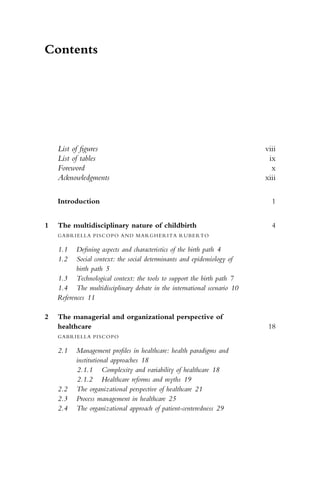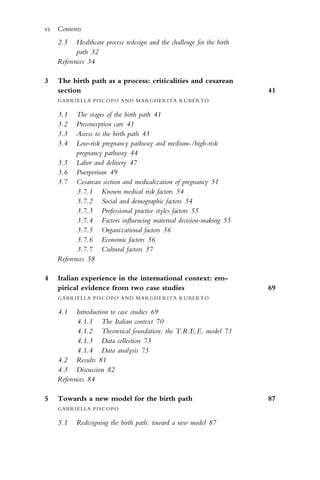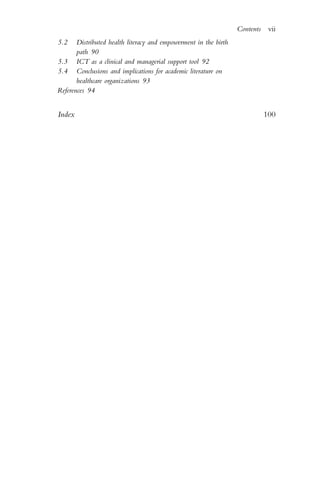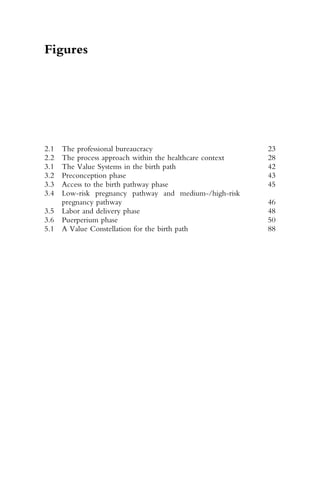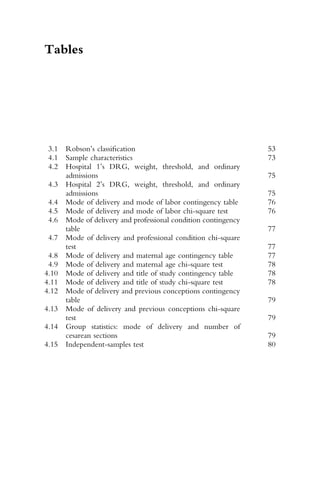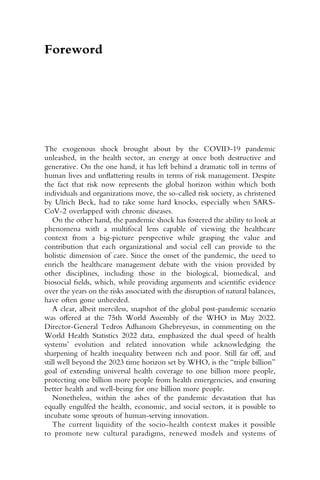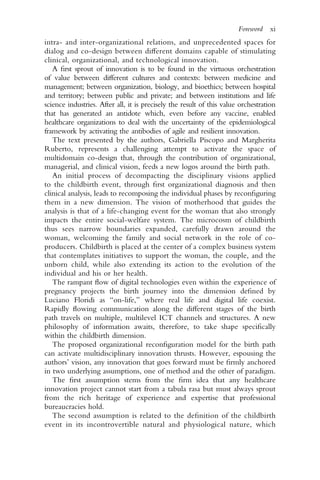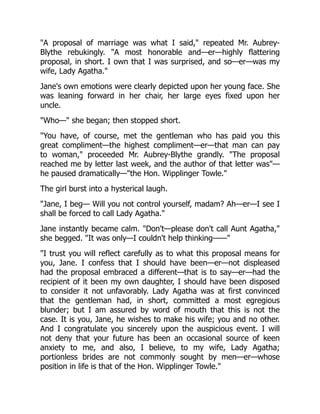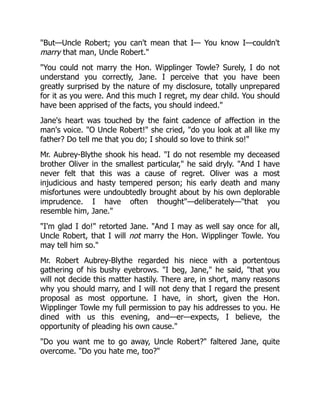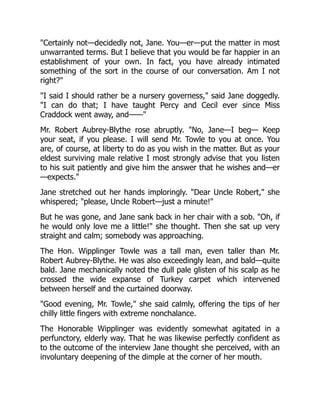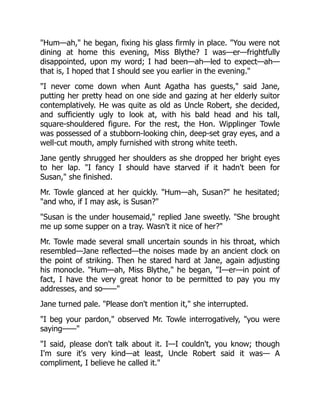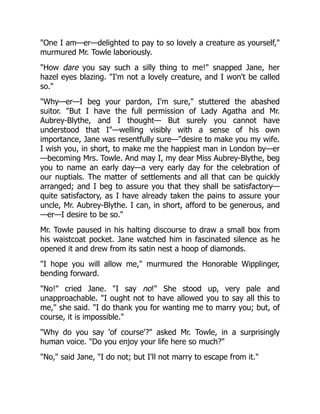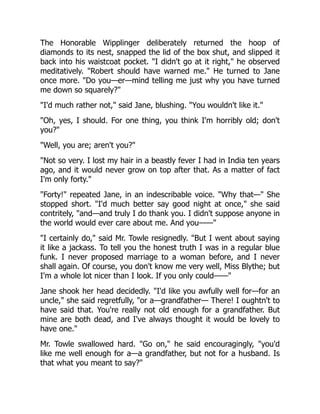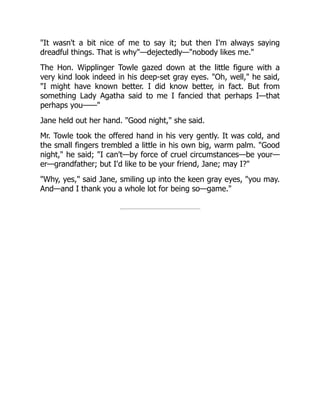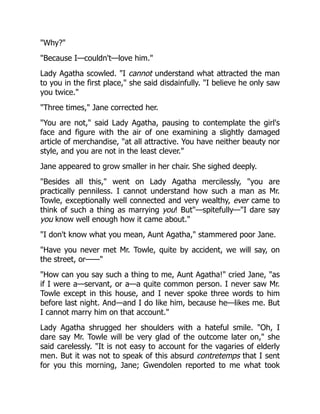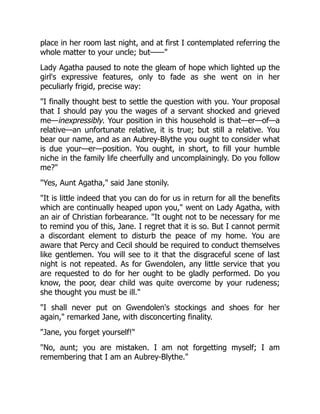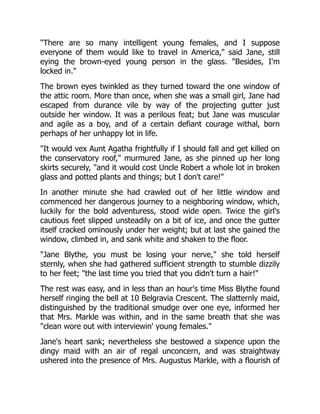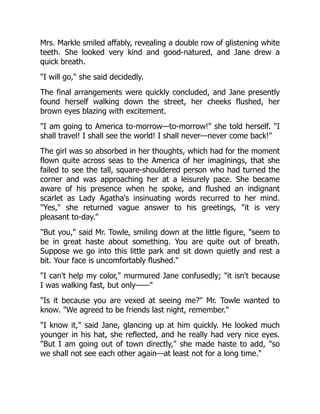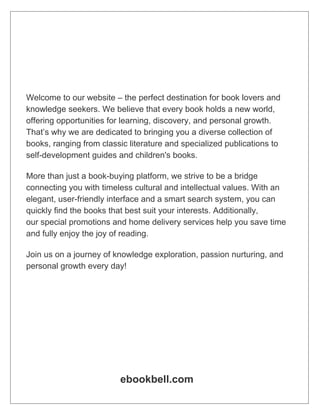Management Organization And Childbirth Towards A New Model For The Birth Path Gabriella Piscopo
- 1. Management Organization And Childbirth Towards A New Model For The Birth Path Gabriella Piscopo download https://ebookbell.com/product/management-organization-and- childbirth-towards-a-new-model-for-the-birth-path-gabriella- piscopo-48723122 Explore and download more ebooks at ebookbell.com
- 2. Here are some recommended products that we believe you will be interested in. You can click the link to download. Management And Information Technology Challenges For The Modern Organization 1st Edition Peter Ekman https://ebookbell.com/product/management-and-information-technology- challenges-for-the-modern-organization-1st-edition-peter-ekman-5220128 Creativity And Innovation In Organizational Teams Leas Organization And Management Hardcover Series In Organization And Management 1st Edition Hoonseok Choi Leigh L Thompson https://ebookbell.com/product/creativity-and-innovation-in- organizational-teams-leas-organization-and-management-hardcover- series-in-organization-and-management-1st-edition-hoonseok-choi-leigh- l-thompson-1368178 Successful Management By Motivation Balancing Intrinsic And Extrinsic Incentives Organization And Management Innovation 1st Edition Bruno S Frey https://ebookbell.com/product/successful-management-by-motivation- balancing-intrinsic-and-extrinsic-incentives-organization-and- management-innovation-1st-edition-bruno-s-frey-155691834 Risk And Crisis Management Planning A Workbook For Organization And Program Administrators Connie Coutellier https://ebookbell.com/product/risk-and-crisis-management-planning-a- workbook-for-organization-and-program-administrators-connie- coutellier-4640012
- 3. Humanistic Management Organization And Aesthetics Micha Szostak https://ebookbell.com/product/humanistic-management-organization-and- aesthetics-micha-szostak-56077992 Management Organization And Employment Strategy Rle Organizations New Directions In Theory And Practice Tony Watson https://ebookbell.com/product/management-organization-and-employment- strategy-rle-organizations-new-directions-in-theory-and-practice-tony- watson-51711520 Oecd Review Of Risk Management Policies Morocco Organization For Economic Cooperation And Development https://ebookbell.com/product/oecd-review-of-risk-management-policies- morocco-organization-for-economic-cooperation-and-development-6685806 On The Shop Floor Two Studies Of Workshop Organization And Output Early Sociology Of Management And Organizations The Early Sociology Of Management And Organizations Reprint T Lupton https://ebookbell.com/product/on-the-shop-floor-two-studies-of- workshop-organization-and-output-early-sociology-of-management-and- organizations-the-early-sociology-of-management-and-organizations- reprint-t-lupton-1719762 Time Management And Selforganization In Academia Developing A Selfdirected And Balanced Life Markus Riedenauer https://ebookbell.com/product/time-management-and-selforganization-in- academia-developing-a-selfdirected-and-balanced-life-markus- riedenauer-49408582
- 5. MANAGEMENT, ORGANIZATION, AND CHILDBIRTH TOWARDS A NEW MODEL FOR THE BIRTH PATH Gabriella Piscopo and Margherita Ruberto Routledge studies in health management
- 6. Management, Organization, and Childbirth Management, Organization, and Childbirth: Towards a New Model for the Birth Path explores the complex topic of the birth path with a multidisciplinary magnifying glass on the paradigms, languages, and tools critical to the organization, management, and clinical science. The work consists of five chapters. The first chapter provides a multidimensional analysis of childbirth. The second chapter presents an organizational analysis that moves in unison with different models of health. The third chapter studies the birth path in organizational and clinical terms by describing it in its core processes. The fourth chapter proposes a study conducted in the Italian context, which identifies some useful determinants for redesigning the birth path. The fifth chapter formulates a proposal for redesigning the birth path based on a new health paradigm. The proposed model offers useful insights for multiple categories of readers. To students of medicine and higher education tracks in healthcare management, it can offer opportunities to raise awareness not only regarding multiprofessional practice but also regarding confrontation with complementary disciplines. To practitioners and policy makers, it can provide useful stimuli to promote rational and informed decisions around the childbirth. To researchers studying the health context within different disciplinary domains, the model can offer unexplored research spaces within the new business complex system. Gabriella Piscopo PhD in Public Management, is Associate Professor of Organization Studies, Scientific Director of the “Observatory on Organizational Behavior and Life Skills”, Deputy Director of the “Leadership and Digital Transformation” Master at the University of Salerno, Italy. She is Management Trainer and Scientific Coordinator of several research projects on Healthcare, Judicial System and Complex Organizations. Margherita Ruberto is PhD in Big Data Management at the University of Salerno, Italy. She is an expert collaborator at AGENAS - National Agency for Regional Health Services (PON Governance e Capacità Istituzionale 2014-2020)
- 7. Routledge studies in health management Edited by Ewan Ferlie The healthcare sector is now of major significance, economically, scientifically and societally. In many countries, healthcare organizations are experiencing major pressures to change and restructure, while cost containment efforts have been ac centuated by global economic crisis. Users are demanding higher service quality, and healthcare professions are experiencing significant reorganization whilst oper ating under increased demands from an ageing population. Critically analytic, politically informed, discursive and theoretically grounded, rather than narrowly technical or positivistic, the series seeks to analyze current healthcare organizations. Reflecting the intense focus of policy and academic in terest, it moves beyond the day to day debate to consider the broader implications of international organizational and management research and different theoretical framings. Making Sense of Organizational Change and Innovation in Health Care An Everyday Ethnography Anne Reff Pedersen Innovating Healthcare The Role of Political, Managerial and Clinical Leadership John Storey and Richard Holti Co-production and Japanese Healthcare Work Environment, Governance, Service Quality and Social Values Victor A. Pestoff Management, Organization, and Childbirth Towards a New Model for the Birth Path Gabriella Piscopo and Margherita Ruberto
- 8. Management, Organization, and Childbirth Towards a New Model for the Birth Path Gabriella Piscopo and Margherita Ruberto
- 9. First published 2023 by Routledge 605 Third Avenue, New York, NY 10158 and by Routledge 4 Park Square, Milton Park, Abingdon, Oxon, OX14 4RN Routledge is an imprint of the Taylor & Francis Group, an informa business © 2023 Gabriella Piscopo and Margherita Ruberto The right of Gabriella Piscopo and Margherita Ruberto to be identified as author[/s] of this work has been asserted in accordance with sections 77 and 78 of the Copyright, Designs and Patents Act 1988. All rights reserved. No part of this book may be reprinted or reproduced or utilised in any form or by any electronic, mechanical, or other means, now known or hereafter invented, including photocopying and recording, or in any information storage or retrieval system, without permission in writing from the publishers. Trademark notice: Product or corporate names may be trademarks or registered trademarks, and are used only for identification and explanation without intent to infringe. ISBN: 978-1-032-36065-2 (hbk) ISBN: 978-1-032-36066-9 (pbk) ISBN: 978-1-003-33009-7 (ebk) DOI: 10.4324/9781003330097 Typeset in Bembo by MPS Limited, Dehradun
- 10. Contents List of figures viii List of tables ix Foreword x Acknowledgments xiii Introduction 1 1 The multidisciplinary nature of childbirth 4 GABRIELLA PISCOPO AND MARGHERITA RUBERTO 1.1 Defining aspects and characteristics of the birth path 4 1.2 Social context: the social determinants and epidemiology of birth path 5 1.3 Technological context: the tools to support the birth path 7 1.4 The multidisciplinary debate in the international scenario 10 References 11 2 The managerial and organizational perspective of healthcare 18 GABRIELLA PISCOPO 2.1 Management profiles in healthcare: health paradigms and institutional approaches 18 2.1.1 Complexity and variability of healthcare 18 2.1.2 Healthcare reforms and myths 19 2.2 The organizational perspective of healthcare 21 2.3 Process management in healthcare 25 2.4 The organizational approach of patient-centeredness 29
- 11. 2.5 Healthcare process redesign and the challenge for the birth path 32 References 34 3 The birth path as a process: criticalities and cesarean section 41 GABRIELLA PISCOPO AND MARGHERITA RUBERTO 3.1 The stages of the birth path 41 3.2 Preconception care 41 3.3 Access to the birth path 43 3.4 Low-risk pregnancy pathway and medium-/high-risk pregnancy pathway 44 3.5 Labor and delivery 47 3.6 Puerperium 49 3.7 Cesarean section and medicalization of pregnancy 51 3.7.1 Known medical risk factors 54 3.7.2 Social and demographic factors 54 3.7.3 Professional practice styles factors 55 3.7.4 Factors influencing maternal decision-making 55 3.7.5 Organizational factors 56 3.7.6 Economic factors 56 3.7.7 Cultural factors 57 References 58 4 Italian experience in the international context: em pirical evidence from two case studies 69 GABRIELLA PISCOPO AND MARGHERITA RUBERTO 4.1 Introduction to case studies 69 4.1.1 The Italian context 70 4.1.2 Theoretical foundation: the T.R.E.E. model 71 4.1.3 Data collection 73 4.1.4 Data analysis 75 4.2 Results 81 4.3 Discussion 82 References 84 5 Towards a new model for the birth path 87 GABRIELLA PISCOPO 5.1 Redesigning the birth path: toward a new model 87 vi Contents
- 12. 5.2 Distributed health literacy and empowerment in the birth path 90 5.3 ICT as a clinical and managerial support tool 92 5.4 Conclusions and implications for academic literature on healthcare organizations 93 References 94 Index 100 Contents vii
- 13. Figures 2.1 The professional bureaucracy 23 2.2 The process approach within the healthcare context 28 3.1 The Value Systems in the birth path 42 3.2 Preconception phase 43 3.3 Access to the birth pathway phase 45 3.4 Low-risk pregnancy pathway and medium-/high-risk pregnancy pathway 46 3.5 Labor and delivery phase 48 3.6 Puerperium phase 50 5.1 A Value Constellation for the birth path 88
- 14. Tables 3.1 Robson’s classification 53 4.1 Sample characteristics 73 4.2 Hospital 1’s DRG, weight, threshold, and ordinary admissions 75 4.3 Hospital 2’s DRG, weight, threshold, and ordinary admissions 75 4.4 Mode of delivery and mode of labor contingency table 76 4.5 Mode of delivery and mode of labor chi-square test 76 4.6 Mode of delivery and professional condition contingency table 77 4.7 Mode of delivery and professional condition chi-square test 77 4.8 Mode of delivery and maternal age contingency table 77 4.9 Mode of delivery and maternal age chi-square test 78 4.10 Mode of delivery and title of study contingency table 78 4.11 Mode of delivery and title of study chi-square test 78 4.12 Mode of delivery and previous conceptions contingency table 79 4.13 Mode of delivery and previous conceptions chi-square test 79 4.14 Group statistics: mode of delivery and number of cesarean sections 79 4.15 Independent-samples test 80
- 15. Foreword The exogenous shock brought about by the COVID-19 pandemic unleashed, in the health sector, an energy at once both destructive and generative. On the one hand, it has left behind a dramatic toll in terms of human lives and unflattering results in terms of risk management. Despite the fact that risk now represents the global horizon within which both individuals and organizations move, the so-called risk society, as christened by Ulrich Beck, had to take some hard knocks, especially when SARS- CoV-2 overlapped with chronic diseases. On the other hand, the pandemic shock has fostered the ability to look at phenomena with a multifocal lens capable of viewing the healthcare context from a big-picture perspective while grasping the value and contribution that each organizational and social cell can provide to the holistic dimension of care. Since the onset of the pandemic, the need to enrich the healthcare management debate with the vision provided by other disciplines, including those in the biological, biomedical, and biosocial fields, which, while providing arguments and scientific evidence over the years on the risks associated with the disruption of natural balances, have often gone unheeded. A clear, albeit merciless, snapshot of the global post-pandemic scenario was offered at the 75th World Assembly of the WHO in May 2022. Director-General Tedros Adhanom Ghebreyesus, in commenting on the World Health Statistics 2022 data, emphasized the dual speed of health systems’ evolution and related innovation while acknowledging the sharpening of health inequality between rich and poor. Still far off, and still well beyond the 2023 time horizon set by WHO, is the “triple billion” goal of extending universal health coverage to one billion more people, protecting one billion more people from health emergencies, and ensuring better health and well-being for one billion more people. Nonetheless, within the ashes of the pandemic devastation that has equally engulfed the health, economic, and social sectors, it is possible to incubate some sprouts of human-serving innovation. The current liquidity of the socio-health context makes it possible to promote new cultural paradigms, renewed models and systems of
- 16. intra- and inter-organizational relations, and unprecedented spaces for dialog and co-design between different domains capable of stimulating clinical, organizational, and technological innovation. A first sprout of innovation is to be found in the virtuous orchestration of value between different cultures and contexts: between medicine and management; between organization, biology, and bioethics; between hospital and territory; between public and private; and between institutions and life science industries. After all, it is precisely the result of this value orchestration that has generated an antidote which, even before any vaccine, enabled healthcare organizations to deal with the uncertainty of the epidemiological framework by activating the antibodies of agile and resilient innovation. The text presented by the authors, Gabriella Piscopo and Margherita Ruberto, represents a challenging attempt to activate the space of multidomain co-design that, through the contribution of organizational, managerial, and clinical vision, feeds a new logos around the birth path. An initial process of decompacting the disciplinary visions applied to the childbirth event, through first organizational diagnosis and then clinical analysis, leads to recomposing the individual phases by reconfiguring them in a new dimension. The vision of motherhood that guides the analysis is that of a life-changing event for the woman that also strongly impacts the entire social-welfare system. The microcosm of childbirth thus sees narrow boundaries expanded, carefully drawn around the woman, welcoming the family and social network in the role of co- producers. Childbirth is placed at the center of a complex business system that contemplates initiatives to support the woman, the couple, and the unborn child, while also extending its action to the evolution of the individual and his or her health. The rampant flow of digital technologies even within the experience of pregnancy projects the birth journey into the dimension defined by Luciano Floridi as “on-life,” where real life and digital life coexist. Rapidly flowing communication along the different stages of the birth path travels on multiple, multilevel ICT channels and structures. A new philosophy of information awaits, therefore, to take shape specifically within the childbirth dimension. The proposed organizational reconfiguration model for the birth path can activate multidisciplinary innovation thrusts. However, espousing the authors’ vision, any innovation that goes forward must be firmly anchored in two underlying assumptions, one of method and the other of paradigm. The first assumption stems from the firm idea that any healthcare innovation project cannot start from a tabula rasa but must always sprout from the rich heritage of experience and expertise that professional bureaucracies hold. The second assumption is related to the definition of the childbirth event in its incontrovertible natural and physiological nature, which Foreword xi
- 17. Random documents with unrelated content Scribd suggests to you:
- 18. "A proposal of marriage was what I said," repeated Mr. Aubrey- Blythe rebukingly. "A most honorable and—er—highly flattering proposal, in short. I own that I was surprised, and so—er—was my wife, Lady Agatha." Jane's own emotions were clearly depicted upon her young face. She was leaning forward in her chair, her large eyes fixed upon her uncle. "Who—" she began; then stopped short. "You have, of course, met the gentleman who has paid you this great compliment—the highest compliment—er—that man can pay to woman," proceeded Mr. Aubrey-Blythe grandly. "The proposal reached me by letter last week, and the author of that letter was"— he paused dramatically—"the Hon. Wipplinger Towle." The girl burst into a hysterical laugh. "Jane, I beg— Will you not control yourself, madam? Ah—er—I see I shall be forced to call Lady Agatha." Jane instantly became calm. "Don't—please don't call Aunt Agatha," she begged. "It was only—I couldn't help thinking——" "I trust you will reflect carefully as to what this proposal means for you, Jane. I confess that I should have been—er—not displeased had the proposal embraced a different—that is to say—er—had the recipient of it been my own daughter, I should have been disposed to consider it not unfavorably. Lady Agatha was at first convinced that the gentleman had, in short, committed a most egregious blunder; but I am assured by word of mouth that this is not the case. It is you, Jane, he wishes to make his wife; you and no other. And I congratulate you sincerely upon the auspicious event. I will not deny that your future has been an occasional source of keen anxiety to me, and also, I believe, to my wife, Lady Agatha; portionless brides are not commonly sought by men—er—whose position in life is that of the Hon. Wipplinger Towle."
- 19. "But—Uncle Robert; you can't mean that I— You know I—couldn't marry that man, Uncle Robert." "You could not marry the Hon. Wipplinger Towle? Surely, I do not understand you correctly, Jane. I perceive that you have been greatly surprised by the nature of my disclosure, totally unprepared for it as you were. And this much I regret, my dear child. You should have been apprised of the facts, you should indeed." Jane's heart was touched by the faint cadence of affection in the man's voice. "O Uncle Robert!" she cried, "do you look at all like my father? Do tell me that you do; I should so love to think so!" Mr. Aubrey-Blythe shook his head. "I do not resemble my deceased brother Oliver in the smallest particular," he said dryly. "And I have never felt that this was a cause of regret. Oliver was a most injudicious and hasty tempered person; his early death and many misfortunes were undoubtedly brought about by his own deplorable imprudence. I have often thought"—deliberately—"that you resemble him, Jane." "I'm glad I do!" retorted Jane. "And I may as well say once for all, Uncle Robert, that I will not marry the Hon. Wipplinger Towle. You may tell him so." Mr. Robert Aubrey-Blythe regarded his niece with a portentous gathering of his bushy eyebrows. "I beg, Jane," he said, "that you will not decide this matter hastily. There are, in short, many reasons why you should marry, and I will not deny that I regard the present proposal as most opportune. I have, in short, given the Hon. Wipplinger Towle my full permission to pay his addresses to you. He dined with us this evening, and—er—expects, I believe, the opportunity of pleading his own cause." "Do you want me to go away, Uncle Robert?" faltered Jane, quite overcome. "Do you hate me, too?"
- 20. "Certainly not—decidedly not, Jane. You—er—put the matter in most unwarranted terms. But I believe that you would be far happier in an establishment of your own. In fact, you have already intimated something of the sort in the course of our conversation. Am I not right?" "I said I should rather be a nursery governess," said Jane doggedly. "I can do that; I have taught Percy and Cecil ever since Miss Craddock went away, and——" Mr. Robert Aubrey-Blythe rose abruptly. "No, Jane—I beg— Keep your seat, if you please. I will send Mr. Towle to you at once. You are, of course, at liberty to do as you wish in the matter. But as your eldest surviving male relative I most strongly advise that you listen to his suit patiently and give him the answer that he wishes and—er —expects." Jane stretched out her hands imploringly. "Dear Uncle Robert," she whispered; "please, Uncle Robert—just a minute!" But he was gone, and Jane sank back in her chair with a sob. "Oh, if he would only love me a little!" she thought. Then she sat up very straight and calm; somebody was approaching. The Hon. Wipplinger Towle was a tall man, even taller than Mr. Robert Aubrey-Blythe. He was also exceedingly lean, and bald—quite bald. Jane mechanically noted the dull pale glisten of his scalp as he crossed the wide expanse of Turkey carpet which intervened between herself and the curtained doorway. "Good evening, Mr. Towle," she said calmly, offering the tips of her chilly little fingers with extreme nonchalance. The Honorable Wipplinger was evidently somewhat agitated in a perfunctory, elderly way. That he was likewise perfectly confident as to the outcome of the interview Jane thought she perceived, with an involuntary deepening of the dimple at the corner of her mouth.
- 21. "Hum—ah," he began, fixing his glass firmly in place. "You were not dining at home this evening, Miss Blythe? I was—er—frightfully disappointed, upon my word; I had been—ah—led to expect—ah— that is, I hoped that I should see you earlier in the evening." "I never come down when Aunt Agatha has guests," said Jane, putting her pretty head on one side and gazing at her elderly suitor contemplatively. He was quite as old as Uncle Robert, she decided, and sufficiently ugly to look at, with his bald head and his tall, square-shouldered figure. For the rest, the Hon. Wipplinger Towle was possessed of a stubborn-looking chin, deep-set gray eyes, and a well-cut mouth, amply furnished with strong white teeth. Jane gently shrugged her shoulders as she dropped her bright eyes to her lap. "I fancy I should have starved if it hadn't been for Susan," she finished. Mr. Towle glanced at her quickly. "Hum—ah, Susan?" he hesitated; "and who, if I may ask, is Susan?" "Susan is the under housemaid," replied Jane sweetly. "She brought me up some supper on a tray. Wasn't it nice of her?" Mr. Towle made several small uncertain sounds in his throat, which resembled—Jane reflected—the noises made by an ancient clock on the point of striking. Then he stared hard at Jane, again adjusting his monocle. "Hum—ah, Miss Blythe," he began, "I—er—in point of fact, I have the very great honor to be permitted to pay you my addresses, and so——" Jane turned pale. "Please don't mention it," she interrupted. "I beg your pardon," observed Mr. Towle interrogatively, "you were saying——" "I said, please don't talk about it. I—I couldn't, you know; though I'm sure it's very kind—at least, Uncle Robert said it was— A compliment, I believe he called it."
- 22. "One I am—er—delighted to pay to so lovely a creature as yourself," murmured Mr. Towle laboriously. "How dare you say such a silly thing to me!" snapped Jane, her hazel eyes blazing. "I'm not a lovely creature, and I won't be called so." "Why—er—I beg your pardon, I'm sure," stuttered the abashed suitor. "But I have the full permission of Lady Agatha and Mr. Aubrey-Blythe, and I thought— But surely you cannot have understood that I"—welling visibly with a sense of his own importance, Jane was resentfully sure—"desire to make you my wife. I wish you, in short, to make me the happiest man in London by—er —becoming Mrs. Towle. And may I, my dear Miss Aubrey-Blythe, beg you to name an early day—a very early day for the celebration of our nuptials. The matter of settlements and all that can be quickly arranged; and I beg to assure you that they shall be satisfactory— quite satisfactory, as I have already taken the pains to assure your uncle, Mr. Aubrey-Blythe. I can, in short, afford to be generous, and —er—I desire to be so." Mr. Towle paused in his halting discourse to draw a small box from his waistcoat pocket. Jane watched him in fascinated silence as he opened it and drew from its satin nest a hoop of diamonds. "I hope you will allow me," murmured the Honorable Wipplinger, bending forward. "No!" cried Jane. "I say no!" She stood up, very pale and unapproachable. "I ought not to have allowed you to say all this to me," she said. "I do thank you for wanting me to marry you; but, of course, it is impossible." "Why do you say 'of course'?" asked Mr. Towle, in a surprisingly human voice. "Do you enjoy your life here so much?" "No," said Jane, "I do not; but I'll not marry to escape from it."
- 23. The Honorable Wipplinger deliberately returned the hoop of diamonds to its nest, snapped the lid of the box shut, and slipped it back into his waistcoat pocket. "I didn't go at it right," he observed meditatively. "Robert should have warned me." He turned to Jane once more. "Do you—er—mind telling me just why you have turned me down so squarely?" "I'd much rather not," said Jane, blushing. "You wouldn't like it." "Oh, yes, I should. For one thing, you think I'm horribly old; don't you?" "Well, you are; aren't you?" "Not so very. I lost my hair in a beastly fever I had in India ten years ago, and it would never grow on top after that. As a matter of fact I'm only forty." "Forty!" repeated Jane, in an indescribable voice. "Why that—" She stopped short. "I'd much better say good night at once," she said contritely, "and—and truly I do thank you. I didn't suppose anyone in the world would ever care about me. And you——" "I certainly do," said Mr. Towle resignedly. "But I went about saying it like a jackass. To tell you the honest truth I was in a regular blue funk. I never proposed marriage to a woman before, and I never shall again. Of course, you don't know me very well, Miss Blythe; but I'm a whole lot nicer than I look. If you only could——" Jane shook her head decidedly. "I'd like you awfully well for—for an uncle," she said regretfully, "or a—grandfather— There! I oughtn't to have said that. You're really not old enough for a grandfather. But mine are both dead, and I've always thought it would be lovely to have one." Mr. Towle swallowed hard. "Go on," he said encouragingly, "you'd like me well enough for a—a grandfather, but not for a husband. Is that what you meant to say?"
- 24. "It wasn't a bit nice of me to say it; but then I'm always saying dreadful things. That is why"—dejectedly—"nobody likes me." The Hon. Wipplinger Towle gazed down at the little figure with a very kind look indeed in his deep-set gray eyes. "Oh, well," he said, "I might have known better. I did know better, in fact. But from something Lady Agatha said to me I fancied that perhaps I—that perhaps you——" Jane held out her hand. "Good night," she said. Mr. Towle took the offered hand in his very gently. It was cold, and the small fingers trembled a little in his own big, warm palm. "Good night," he said; "I can't—by force of cruel circumstances—be your— er—grandfather; but I'd like to be your friend, Jane; may I?" "Why, yes," said Jane, smiling up into the keen gray eyes, "you may. And—and I thank you a whole lot for being so—game."
- 25. CHAPTER IV Lady Agatha Aubrey-Blythe looked up from the housekeeper's book which she was inspecting with displeased interest, and turned her light blue eyes upon her husband's niece, as she stood a forlorn yet rigidly defiant little figure, her back against the closed door. "You may come in, Jane, and sit down," said Lady Agatha, in precisely the same tone she would have used to a delinquent housemaid. Jane advanced and sat down, every line of her face and figure expressing an exasperating indifference to the stately hauteur of the lady, who on her part proceeded to concentrate her entire attention upon a bundle of tradesmen's accounts, which she compared one by one with the entries in the housekeeper's book. This went on for some twenty minutes, during which period Jane stared unremittingly out of the window against which a cold rain was beating. Then Lady Agatha spoke: "I have purposely detained you in complete silence, Jane, that you might reflect quietly upon your present position in life. I trust you have made good use of the opportunity." Jane made no reply; but she withdrew her eyes from the dripping window pane and fixed them upon her aunt. In return, Lady Agatha focused her frozen stare upon the girl. "Is it possible that you had the presumption to refuse Mr. Towle's offer of marriage last night?" she asked with an indescribable mixture of unwilling respect and cold dislike in her voice. "Yes, Aunt Agatha, I did," said Jane, a faint expression of regret passing over her face.
- 26. "Why?" "Because I—couldn't—love him." Lady Agatha scowled. "I cannot understand what attracted the man to you in the first place," she said disdainfully. "I believe he only saw you twice." "Three times," Jane corrected her. "You are not," said Lady Agatha, pausing to contemplate the girl's face and figure with the air of one examining a slightly damaged article of merchandise, "at all attractive. You have neither beauty nor style, and you are not in the least clever." Jane appeared to grow smaller in her chair. She sighed deeply. "Besides all this," went on Lady Agatha mercilessly, "you are practically penniless. I cannot understand how such a man as Mr. Towle, exceptionally well connected and very wealthy, ever came to think of such a thing as marrying you! But"—spitefully—"I dare say you know well enough how it came about." "I don't know what you mean, Aunt Agatha," stammered poor Jane. "Have you never met Mr. Towle, quite by accident, we will say, on the street, or——" "How can you say such a thing to me, Aunt Agatha!" cried Jane, "as if I were a—servant, or a—a quite common person. I never saw Mr. Towle except in this house, and I never spoke three words to him before last night. And—and I do like him, because he—likes me. But I cannot marry him on that account." Lady Agatha shrugged her shoulders with a hateful smile. "Oh, I dare say Mr. Towle will be very glad of the outcome later on," she said carelessly. "It is not easy to account for the vagaries of elderly men. But it was not to speak of this absurd contretemps that I sent for you this morning, Jane; Gwendolen reported to me what took
- 27. place in her room last night, and at first I contemplated referring the whole matter to your uncle; but——" Lady Agatha paused to note the gleam of hope which lighted up the girl's expressive features, only to fade as she went on in her peculiarly frigid, precise way: "I finally thought best to settle the question with you. Your proposal that I should pay you the wages of a servant shocked and grieved me—inexpressibly. Your position in this household is that—er—of—a relative—an unfortunate relative, it is true; but still a relative. You bear our name, and as an Aubrey-Blythe you ought to consider what is due your—er—position. You ought, in short, to fill your humble niche in the family life cheerfully and uncomplainingly. Do you follow me?" "Yes, Aunt Agatha," said Jane stonily. "It is little indeed that you can do for us in return for all the benefits which are continually heaped upon you," went on Lady Agatha, with an air of Christian forbearance. "It ought not to be necessary for me to remind you of this, Jane. I regret that it is so. But I cannot permit a discordant element to disturb the peace of my home. You are aware that Percy and Cecil should be required to conduct themselves like gentlemen. You will see to it that the disgraceful scene of last night is not repeated. As for Gwendolen, any little service that you are requested to do for her ought to be gladly performed. Do you know, the poor, dear child was quite overcome by your rudeness; she thought you must be ill." "I shall never put on Gwendolen's stockings and shoes for her again," remarked Jane, with disconcerting finality. "Jane, you forget yourself!" "No, aunt; you are mistaken. I am not forgetting myself; I am remembering that I am an Aubrey-Blythe."
- 28. Lady Agatha stared blankly at the girl for a full minute. Then she recovered herself. "You are an ungrateful, impertinent girl!" she said slowly. "If you were younger I should feel it my duty to ferule you severely. There is one other thing I wish to speak to you about; then you may go. I have observed that you are far too familiar and presuming in your manner toward your cousin Reginald. His future position in the world as my oldest son and his father's heir does not warrant any such attitude on your part." "Did Reginald tell you that he tried to kiss me on the stairs last night, and that I slapped him for it?" inquired Jane, in a businesslike tone. "It was 'familiar' of me, I admit; but Reginald is such a cub, you know." Lady Agatha rose to her full height. "You may go to your room, Jane, and stay there for the remainder of the day," she said in an awful voice. "I see that my Christian charity is entirely misplaced in your case. I shall, after all, be obliged to consult your uncle with regard to some other disposal of your person. I cannot bear you about me longer. Your influence on my dear children is most unfortunate!" Jane turned sharply—she already had her hand upon the door. "I hope uncle will send me away!" she exclaimed passionately. "I hate this house and everyone in it—except Percy and Susan!" Lady Agatha, shaken out of her usual icy self-control, darted forward. She was a tall, big woman and she swept the girl before her in a blast of cold fury up the stairs—two flights of them—to the little attic room; there she thrust the slight figure within, and locked the door upon it. Jane stood in the middle of the floor and listened to the ugly click of the key and the sound of Lady Agatha's retreating boot heels on the uncarpeted corridor. "Well," said Jane ruefully. "I have made a mess of it!" She had completely forgotten her prayer of the night before.
- 29. Somebody had laid a fire in her rusty little grate. It was Susan, of course, who was continually going out of her way to be kind to the girl to whom everyone else was so persistently and pointedly unkind. Jane's sore heart warmed toward honest Susan, as she hunted for a match in the ugly little safe on the mantel. "I've a day off, anyway," she told herself, "and I'll cobble up that old gown of Gwen's so that I can wear it." Miss Blythe was well used to cobbling up old gowns and clever at it, too. She waxed increasingly cheerful as she spread the faded breadths across her knee and discovered that the wrong side of the fabric was fresh and bright. Later she congratulated herself upon a stray sheet of The Times, left behind by Susan after laying the fire; it would do admirably for pattern material. As she spread its crumpled folds upon her counterpane, preparatory to evolving a wonderful yoke design, her eye fell upon a line in the column of "Female Help Wanted." It read as follows: "A lady about to travel in America wishes to engage intelligent young female as companion. Good wages. Duties nominal. Apply mornings to Mrs. Augustus Markle, 10 Belgravia Crescent." "Oh!" murmured Jane Blythe. She sank down on the edge of her hard little bed and read the fateful lines again. "A lady about to travel in America—an intelligent young female as traveling companion. Why, I am an intelligent young female!" exclaimed Jane, with the air of a discoverer; "I wonder if I look the part?" She stared at her young reflection in the dim mirror over her little dressing table. "I believe I look sufficiently 'intelligent' to perform 'nominal duties' as a companion," she told herself candidly. Then she hunted for the date of the paper, and was ready to shed tears of disappointment when she discovered that it was that of the previous day.
- 30. "There are so many intelligent young females, and I suppose everyone of them would like to travel in America," said Jane, still eying the brown-eyed young person in the glass. "Besides, I'm locked in." The brown eyes twinkled as they turned toward the one window of the attic room. More than once, when she was a small girl, Jane had escaped from durance vile by way of the projecting gutter just outside her window. It was a perilous feat; but Jane was muscular and agile as a boy, and of a certain defiant courage withal, born perhaps of her unhappy lot in life. "It would vex Aunt Agatha frightfully if I should fall and get killed on the conservatory roof," murmured Jane, as she pinned up her long skirts securely, "and it would cost Uncle Robert a whole lot in broken glass and potted plants and things; but I don't care!" In another minute she had crawled out of her little window and commenced her dangerous journey to a neighboring window, which, luckily for the bold adventuress, stood wide open. Twice the girl's cautious feet slipped unsteadily on a bit of ice, and once the gutter itself cracked ominously under her weight; but at last she gained the window, climbed in, and sank white and shaken to the floor. "Jane Blythe, you must be losing your nerve," she told herself sternly, when she had gathered sufficient strength to stumble dizzily to her feet; "the last time you tried that you didn't turn a hair!" The rest was easy, and in less than an hour's time Miss Blythe found herself ringing the bell at 10 Belgravia Crescent. The slatternly maid, distinguished by the traditional smudge over one eye, informed her that Mrs. Markle was within, and in the same breath that she was "clean wore out with interviewin' young females." Jane's heart sank; nevertheless she bestowed a sixpence upon the dingy maid with an air of regal unconcern, and was straightway ushered into the presence of Mrs. Augustus Markle, with a flourish of
- 31. the dingy one's plaided pinafore and the brief announcement: "'Ere's another of 'em, ma'am!" The stout lady, solidly enthroned upon a sofa before the dispirited fire, did not turn her elaborately coiffured head. "Ze young woman may come in," intoned a full, rich, foreign- sounding voice which somewhat prepared Jane for the large, dark, highly colored visage, flanked with dubious diamond eardrops, which Mrs. Markle turned upon her visitor. "You wis' to inquire about ze situation—eh?" pursued this individual, without any token of impatience. "I haf already seen feefty of ze London demoiselles ce matin." "Oh, if you have already engaged some one, I will not trouble you!" stammered Jane, edging toward the door. "Not so fast—not so fast, madmoiselle; it iss true I haf already engage; but— Ah, zis iss bettaire! More chic—oui. Your name, s'il vous plait?" "Jane Evelyn Aubrey-Blythe," murmured the girl. "An' you wis' to go to ze ozzer side—to America—oui?" "I wish to leave London; yes." "To-morrow evenin', zen, I go by ze train. Zen I sail on ze so gra-a- nd ship. You go wiz me—eh?" Jane stared at the woman with some astonishment. "What would be my—my duties?" she asked. "Your duties? Why, to go wiz me—my compagnon de voyage— comprenez? Nossing else, I assure you; I wait on myself. But I am— what you call it—lone-some—see? An' I require a nize, young lady to go wiz me."
- 32. Mrs. Markle smiled affably, revealing a double row of glistening white teeth. She looked very kind and good-natured, and Jane drew a quick breath. "I will go," she said decidedly. The final arrangements were quickly concluded, and Jane presently found herself walking down the street, her cheeks flushed, her brown eyes blazing with excitement. "I am going to America to-morrow—to-morrow!" she told herself. "I shall travel! I shall see the world! I shall never—never come back!" The girl was so absorbed in her thoughts, which had for the moment flown quite across seas to the America of her imaginings, that she failed to see the tall, square-shouldered person who had turned the corner and was approaching her at a leisurely pace. She became aware of his presence when he spoke, and flushed an indignant scarlet as Lady Agatha's insinuating words recurred to her mind. "Yes," she returned vague answer to his greetings, "it is very pleasant to-day." "But you," said Mr. Towle, smiling down at the little figure, "seem to be in great haste about something. You are quite out of breath. Suppose we go into this little park and sit down quietly and rest a bit. Your face is uncomfortably flushed." "I can't help my color," murmured Jane confusedly; "it isn't because I was walking fast, but only——" "Is it because you are vexed at seeing me?" Mr. Towle wanted to know. "We agreed to be friends last night, remember." "I know it," said Jane, glancing up at him quickly. He looked much younger in his hat, she reflected, and he really had very nice eyes. "But I am going out of town directly," she made haste to add, "so we shall not see each other again—at least not for a long time."
- 33. "You are going away?" said Mr. Towle blankly. "Where—if I may ask without seeming impertinent?" "I don't know exactly," replied Jane, with a provoking smile. "I am going to travel." Then she bit her tongue till it hurt. "Really, now you will see why I must hurry home at once. And—and, please don't mention what I have said to—to Aunt Agatha or Uncle Robert." Mr. Towle regarded her in puzzled silence. "I beg your pardon," he said stiffly. "You were referring to what passed between us last night? I have already told your—ah—guardians the result of my proposals, and they——" "Oh, I didn't mean that!" cried Jane. "How could you think so? I meant— Oh, won't you go away and not talk to me any more about it! You oughtn't to have liked me anyway. Aunt Agatha said so. She told me this morning that I was not at all attractive, and I am poor, too—perhaps you didn't know that—and—and—I am not at all clever; you can't help seeing that for yourself. I hope you will forget that you ever saw me those three times at Uncle Robert's." "One time would have been enough for me," said Mr. Towle earnestly; "but as a matter of fact I have seen you more than three times. I never counted the occasions, but I saw you as often as possible, as for example when you went out with the two little boys in the governess cart, and when you walked with them in the Park, and twice in the Museum. Do you remember the day you showed them the mummies? You were telling them a long story about a little Egyptian princess; then you showed them the toys found in her tomb, and the mummy itself wrapped in browned linen, a withered lotus flower stuck in the bandages." Jane stared at him meditatively. "I didn't see you anywhere about," she said. "No; I took good care that you should not," Mr. Towle observed. "Now I am sorry for it."
- 34. "Why?" asked Jane; then bit her tongue again in her confusion. "I—I mean it would have been very—nice. I should have said I——" "I was a bally idiot," pursued Mr. Towle steadily, "not to have taken the pains to become acquainted with you in any way, however unconventional. If I had, perhaps you would not have disliked me so." "Oh, but I do not dislike you in the least!" protested Jane. "If you could like me a very little," he said eagerly, "perhaps in time you could—Jane, if you are fond of travel I would take you all over the world. You should see everything. I thought I was done with happiness till I saw you. I had nothing to look forward to. I had seen everything, tested everything, and found everything empty and hateful, but with you at my side— Won't you try to like me, Jane?" What Jane would have replied, had she not glanced up on the instant, she never afterwards felt entirely sure. But glance up she did to meet Gwendolen's scornful eyes fixed full upon her as she whirled past them in the Aubrey-Blythe victoria, with a great show of Aubrey-Blythe liveries on the box. Instantly the forlorn little shoot of gratitude which was trying its feeble best to masquerade as sentiment in Jane's lonely heart withered and died under the icy blast of impotent anger and fear which passed over her. "She will tell Aunt Agatha," thought poor Jane, "and Aunt Agatha will think I have lied to her about seeing Mr. Towle on the street." By some untoward psychological process, quite unperceived by herself, the full torrent of Miss Blythe's wrath was instantly turned upon the man at her side. "I think I must say good morning, Mr. Towle," she said coldly. "I am really very much occupied to-day. I am sure I thank you for thinking of me so kindly—" She stopped determinedly and held out her hand.
- 35. And the Hon. Wipplinger Towle, feeling himself to be dismissed in all the harrowing length and breadth of the word, took his leave of her instantly, with a courteous lifting of his hat which afforded Jane a parting glimpse of his prematurely bald head. "It must be dreadful to be bald," reflected Jane, with vague contrition, as she walked away; "but I can't help it." The correlation of these two ideas being more intimate and profound than appears in a cursory reading of them. The door of Lady Agatha's morning room stood open as Jane attempted to slip past it like a guilty shadow. Gwendolen, still attired in her hat and jacket, evidently saw her and apprised her mother of the fact, for Lady Agatha's pursuing voice arrested the girl in full flight toward her own room. "You will, perhaps, be good enough to inform me, Jane, how you came to be on the street after I had locked you into your own room for the day," intoned Lady Agatha, in a terrible voice. "Deceitful, ungrateful, vulgar girl, that you are!" "I saw you, sly-boots; so you needn't deny it," put in Gwendolen, with a spiteful laugh. "It was passing strange how our demure Jane chanced to have a proposal, was it not? Do you know, mamma, Ethel Brantwood told me this morning that that man had been seen tagging Jane all over London. It is quite the common talk." "Oh!" cried Jane, wringing her hands. "What shall I do?" "Do not attempt to hoodwink me longer, unhappy girl," pursued Lady Agatha. "Your deceit, ingratitude, and vulgar intrigues are all laid bare. I have not decided what I shall do with you. It appears"— dramatically—"that locks and bars are no barriers to you. My commands you defy, my counsels you ignore, my affections you trample under foot!" "Stop, Aunt Agatha!" cried Jane. "I did climb out of the window after you had locked me in—I wish now that I had fallen on the
- 36. conservatory roof and killed myself; you wouldn't have minded anything but the broken glass—but you must believe that I never saw Mr. Towle on the street before. He has followed me about; he told me so this morning. But he never spoke to me once, and I did not know it. I never have thought of seeing him." "How extremely ingenuous and naive!" put in Gwendolen, with an ugly titter; "quite after the pattern of a cheap variety actress, indeed! I wonder, mamma, that Mr. Towle took the pains to propose marriage to Jane in the dull, old-fashioned way. He might as well have eloped without ceremony." Jane stared at her cousin, her face slowly whitening. "Do you realize what you have said to me, Gwendolen?" she asked in a stifled voice. "Yes. I see that you do. If you were a man I should—kill you. But you are only you, so I shall content myself by never speaking to you again." "Gwendolen, my love, will you kindly leave us for a few minutes," said Lady Agatha, very calm and stately. "I cannot permit your young ears to be sullied by this mad talk. Really, I fear that the unfortunate girl's reason has been—" She paused significantly and touched her forehead. "I am told there has always been a marked weakness in her mother's family. Go, my love, go!" "I shall go, too," said Jane bitterly. "I have nothing more to say to you, Aunt Agatha. I have told you the exact truth, and you may believe it or not as you like." She turned and followed Gwendolen out of the room. That young lady, hearing the step behind her, fled with a hysterical shriek to the shelter of her mother's room. "What do you think, mamma, the creature was actually pursuing me!" Jane heard her say. Then Jane went slowly up the stairs to her own room, where she remained quite alone and undisturbed for the remainder of the day. At intervals, during the course of the dreary afternoon, she could
- 37. hear faint sounds of opening and shutting doors below stairs. Once Percy's loud voice and the clatter of his stout little shoes appeared to be approaching her room; then some one called him in a subdued voice; there was a short altercation carried on at a gradually increasing distance; then silence again. A horrible sense of disgrace and isolation gradually descended upon the girl. She sobbed wildly as she looked over her few cherished possessions preparatory to packing them in the box she dragged in from the attic; her mother's watch, a locket containing her father's picture, a ring or two, her shabby little gowns and meager toilet things. By the time she had locked and strapped the box with shaking fingers she was shivering with cold and faint with hunger. The latter primal urge finally drove her forth and down the rear stairways to the kitchen, where she found the servants in full tide of preparation for dinner. "Lud ha' mussy, Miss Jane Evelyn!" cried Susan. "Where 'ave you be'n to look that white an' done hup?" "In my room," said Jane shortly. "Will you give me some tea and bread, Susan? I'll take it up myself. No; please don't follow me. I wish to be alone." "Somethink's hup wi' 'er," observed cook sagaciously, as Jane disappeared with a brace of thick sandwiches cut by the zealous Susan. "They'd orto be 'shamed o' theirsels; that they 'ad, a-puttin' upon a sweet young lady like Miss Jane Evelyn," opined Susan. "I'd like to give 'em all a piece o' my mind; it 'ud do me good. It would so!" "You're a goose, Susan," laughed cook. "An' so is she, if all I 'ear is c'rrect. Tummas says as 'ow that military-appearin' gent wot comes 'ere is crazy to marry 'er. An 'e's rich's cream!" "Oh, lud!" sniffed Susan, her nose in the air, "'e may be rich, but 'e's bald as a happle! She'd never 'ave 'im; I'll bet me hown 'air an' me
- 38. Welcome to our website – the perfect destination for book lovers and knowledge seekers. We believe that every book holds a new world, offering opportunities for learning, discovery, and personal growth. That’s why we are dedicated to bringing you a diverse collection of books, ranging from classic literature and specialized publications to self-development guides and children's books. More than just a book-buying platform, we strive to be a bridge connecting you with timeless cultural and intellectual values. With an elegant, user-friendly interface and a smart search system, you can quickly find the books that best suit your interests. Additionally, our special promotions and home delivery services help you save time and fully enjoy the joy of reading. Join us on a journey of knowledge exploration, passion nurturing, and personal growth every day! ebookbell.com
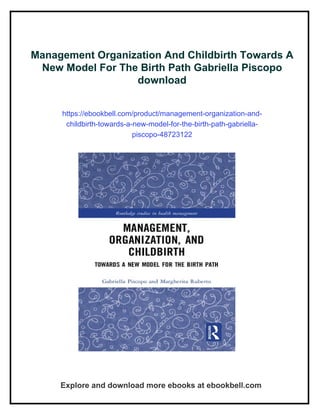
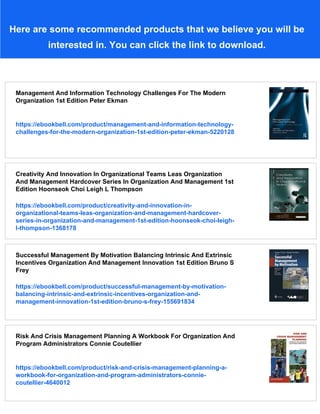
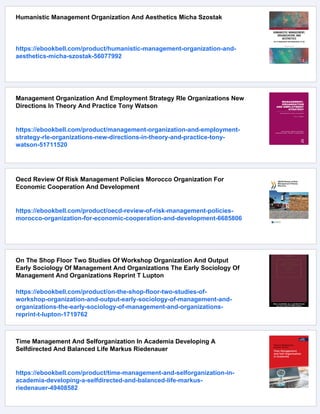

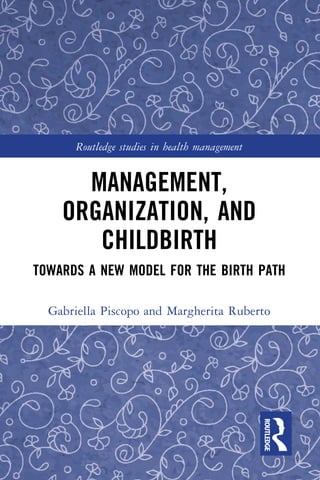
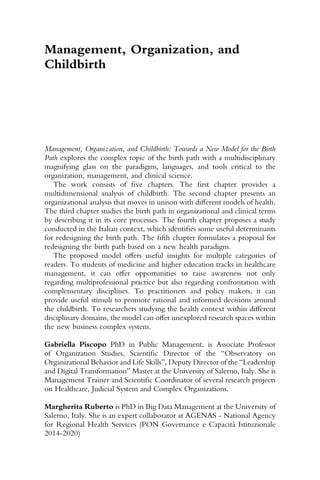
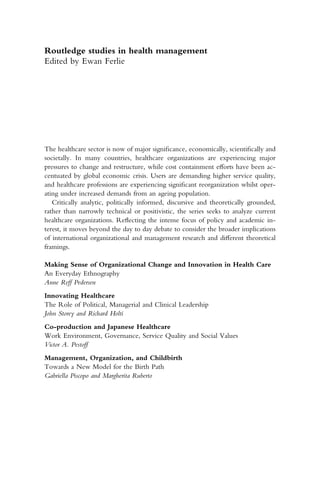
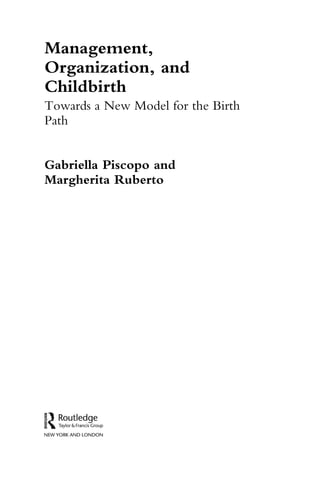
![First published 2023
by Routledge
605 Third Avenue, New York, NY 10158
and by Routledge
4 Park Square, Milton Park, Abingdon, Oxon, OX14 4RN
Routledge is an imprint of the Taylor & Francis Group, an informa business
© 2023 Gabriella Piscopo and Margherita Ruberto
The right of Gabriella Piscopo and Margherita Ruberto to be identified
as author[/s] of this work has been asserted in accordance with sections
77 and 78 of the Copyright, Designs and Patents Act 1988.
All rights reserved. No part of this book may be reprinted or reproduced
or utilised in any form or by any electronic, mechanical, or other means,
now known or hereafter invented, including photocopying and
recording, or in any information storage or retrieval system, without
permission in writing from the publishers.
Trademark notice: Product or corporate names may be trademarks or
registered trademarks, and are used only for identification and
explanation without intent to infringe.
ISBN: 978-1-032-36065-2 (hbk)
ISBN: 978-1-032-36066-9 (pbk)
ISBN: 978-1-003-33009-7 (ebk)
DOI: 10.4324/9781003330097
Typeset in Bembo
by MPS Limited, Dehradun](https://image.slidesharecdn.com/24361561-250524033356-976d7fbb/85/Management-Organization-And-Childbirth-Towards-A-New-Model-For-The-Birth-Path-Gabriella-Piscopo-9-320.jpg)
